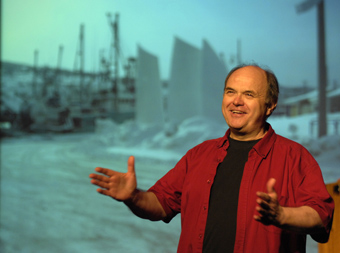 |
Andy Jones, To the Wall photo Michael Rayner |
Most of the time fitposs (“a déjà vu of the future”) prepares us for the worst, but September 11, 2001 shocked the atheist Jones into prayer—what else could you do, he asks. This plunges him into a big question—are we God’s experimental failure (God wanted equals, got nasty supplicants and is profoundly lonely, and therefore absent)? He offers some big solutions—let’s invite God to a public meeting, in this theatre, tonight, and propose some genetic tweaking. Without fitposs we might be a nicer species (Jones rattles off a history of the demise of earlier humans not fitted with fitposs—the first of our kind were, of course, Adam and Eve). While modifying our anxiety generator might seem a reasonable idea, Jones is not reasonable in any ordinary sense, suggesting that we have anxiety thermostats visibly implanted over our nipples (slide of Uma Thurman at an Academy Awards thus technically adorned). This will not only make us more aware of each other’s emotional fluctuations but generate some new language: “Go fluctuate yourself!” Wilder evolutionary engineerings are suggested later in the show, but in the meantime there’s much else to rapidly absorb and to reflect on: what would be the saddest story you could tell a rabbit such that its tears would turn to ice and lock it to the ground (and provide you with dinner)?
This is discursive theatre, Jones playing out a persona doubtless rooted in the real man and stylistically reminiscent of the American Spalding Gray, if without the incantatory poetry or darker personal musings, and the UK’s Ken Campbell (Jones was a performer for a period with the Ken Campbell Roadshow). Like Campbell, Jones is in love with the big picture, generating wildly improbable theses that nonetheless tell us much about what worries us and the kinds of not always silly fuzzy logic we apply to such mysteries. Again like Campbell, there’s a mix of real if distorted science and wacko cosmology. Some episodes seem simply off the air, smutty, over elaborate but usually arrive at a kind of meaningfulness, as does the seductive rhetorical illogic of a good sermon (which he illustrates at one stage). Jones introduces us to the Newfoundland beef bucket (used to tenderise tough brisket in salt) deployed in an experiment with his three nubile assistants, seen on screen. They fling sand from such a bucket millions of times, looking to form by chance the perfect shape of Newfoundland and Labrador and they get close. But of course God created randomness. What can you do?
That Newfoundlanders would indulge in such flights of scientific fancy and many other bizarre activities, Jones attributes to the N-factor—a Newfoundland facility for doing things in very odd, lateral and sometimes surprisingly successful ways. This takes us into the country’s history, back to the 18th century, and the Jones’ family’s connection with it, climaxing in the story of his aunt Mary, a Newfoundland beauty who eloped with a protestant English diplomat who was then posted to Berlin in 1939. There it was rumoured Mary, now with an imperious upperclass British accent, snubbed Hitler, so mortifying him that he gave up on invading Great Britain. That’s lateral. The story includes delightful photographs (by Louise Abbott) of a family wedding on a windy Newfoundland day, bridesmaids tottering about the uneven landscape. “No one seems to notice they’re living on a rock!” quips Jones.
If Ken Campbell seems to teeter on the edge of madness in his wilder flights, Jones is on safer ground, for example diverting any extreme nuttiness into the portrayal of a Catholic priest, with Jones asking us stamp our feet when the clergyman has crossed the line into insanity. We’re stamping pretty quickly, but Jones signals that worse is to come.
Like Campbell and Gray, Jones is a deft weaver of tales and ideas, leaving many threads hanging and then ravelling them with bravura sleights of hand. But there are still always surprises to come: “You’re wondering what this show is all about? … Mating!” The cosmological weft is suddenly evolutionary (an earlier thread now picked up) and we’re warped into an hilarious fantasy of genetic tweaking providing the inadequate male with the voice of JFK and bigger buttocks.
There’s plenty to take away with you from To the Wall. Just how many human problems are generated by ‘fitposs’ and what would we be like without it? Why does a confirmed atheist turn to God in moments of extreme crisis? Jones, garbed in a plethora of priestly vestments from different cultures, invites God to join us. He doesn’t turn up, but Jones trips, falls to the stage, and with good Catholic logic, suspects He has been silently present. What are the odds? Other questions linger. How can Catholicism continue to be a creative force when such a punishing one? Above all, is Jones’ account of Newfoundland quirkiness (the N-factor), a condition compounded by Catholicism, true just of his home culture, or is it recognisable, in other ways, in Tasmania or Australia—whose people are so often inclined to insularity, especially now?
Occasional sillinesses aside, To the Wall is amusing and sometimes bracing, performed with affable ease and a self-mockery which fellow islanders from all over will recognise. Best of all, Jones takes the edge off our own troubling fitposs for a while.
To the Wall, writer-performer Andy Jones, director Charlie Tomlinson; Playhouse Theatre, Ten Days on the Island, March 23-26
Keith Gallasch is the Managing Editor of RealTime.
© Keith Gallasch; for permission to reproduce apply to [email protected]








 back
back